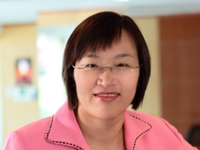
Breaking the glass ceiling with lifelong education
International Women’s Day is an annual global celebration of women in the world today. Amid the celebrations, we also take time to reflect on what we women have achieved and what more we can do.
When I graduated with an accountancy degree in 1990, I was the first woman in my family to receive the university scroll. Indeed, it was deemed a milestone that my mother could only dream of.
Mirroring this spurt of educational achievements is the expanding role that women play in the Singapore economy over the years. According to Singapore Population Census 2010, women make up 56.5% of the total labour force in Singapore – up from 50.2% in 2000.
Women are also working longer – in 2000, about 31% of women between 55 – 59 years old hold a job, in 2010, more than 51% in that age group remained in the labour force.
Women are also scaling the career ladder faster and in greater numbers. In the Singapore civil service, female civil servants in Division 1 have soared from 14.560 in 2000 to 25,196 in 2010, while male civil servants in the same category numbered 14,964.
Overall, women outnumbered males in the civil service, accounting for 56.4% of the total workforce in government today.
Naturally, these figures do us proud. As women, we’re making a visible impact not just on the economy but also in government.
However, more can be done to help women rise faster and occupy more strategic management positions. A recent Singapore Board Diversity Index revealed that women in Singapore are represented more highly in the boardrooms of local statutory boards, holding 19.8 per cent of board positions, than those in listed companies, where they hold 6.9 per cent of positions.
Some 16.9 per cent of chairpersons in statutory boards were also female, compared to only 2.7 per cent in listed companies.
These findings showed that women still have some way to go before making a more visible presence in the top echelons of government and corporations.
So, what can be done? Should there be definite gender quotas set for board representation? Or can women themselves take more initiatives to develop themselves further, strengthen their networks and chart their own growth path to reach their goals.
I believe that women today can shape their destiny through knowledge enhancement or lifelong learning and active networking as well as mentoring.
More women should be aware of the opportunities available to them in developing themselves. Furthermore, they should inspire change leading to a better future for them.
Currently, many opportunities abound for self improvement through skills upgrading, professional and on-the-job training. Indeed, the Singapore government has launched a slew of measures to help working women tap more knowledge and skills and new incentives to coax housewives to re-join the workforce.
Also, there are also many companies making it easier for working mothers to balance work and family commitments – such as childcare and flexi-work options.
It is essential for women to gain more knowledge and skills through life-long learning to stay relevant and employable and continue making strides in society.
So it is advisable for them to take advantage of scholarships and WDA schemes to attain their next educational qualification.
While academic pursuits, are important, women must also actively network to get their dream jobs. They need to bond more closely and forge build social linkages to suss out opportunities and capitalise on market entries.
Women should also help each other move up the career ladder. Therefore, mentoring systems are good platforms for successful women to nurture others to help them fit into increasingly competitive global corporations and complex bureacracies.
Of course, more should be done to encourage companies to level the playing field from the start for women employees. Any form of discrimination against women should not be condoned, as this is counter-productive not just to the companies but also the larger economy.
Of course, women themselves should not stifle themselves by harboring negative perceptions. They should not let the proverbial “glass ceiling” hamper them in their aspirations for higher positions. Such perceived constraints only serve to perpetuate the weaknesses of women.
Indeed, “glass ceilings” if they exist at all, should have been shattered long ago.
Tan Gek Khim, PBM, Senior Director, MDIS (Management Development Institute of Singapore)
























 Advertise
Advertise






